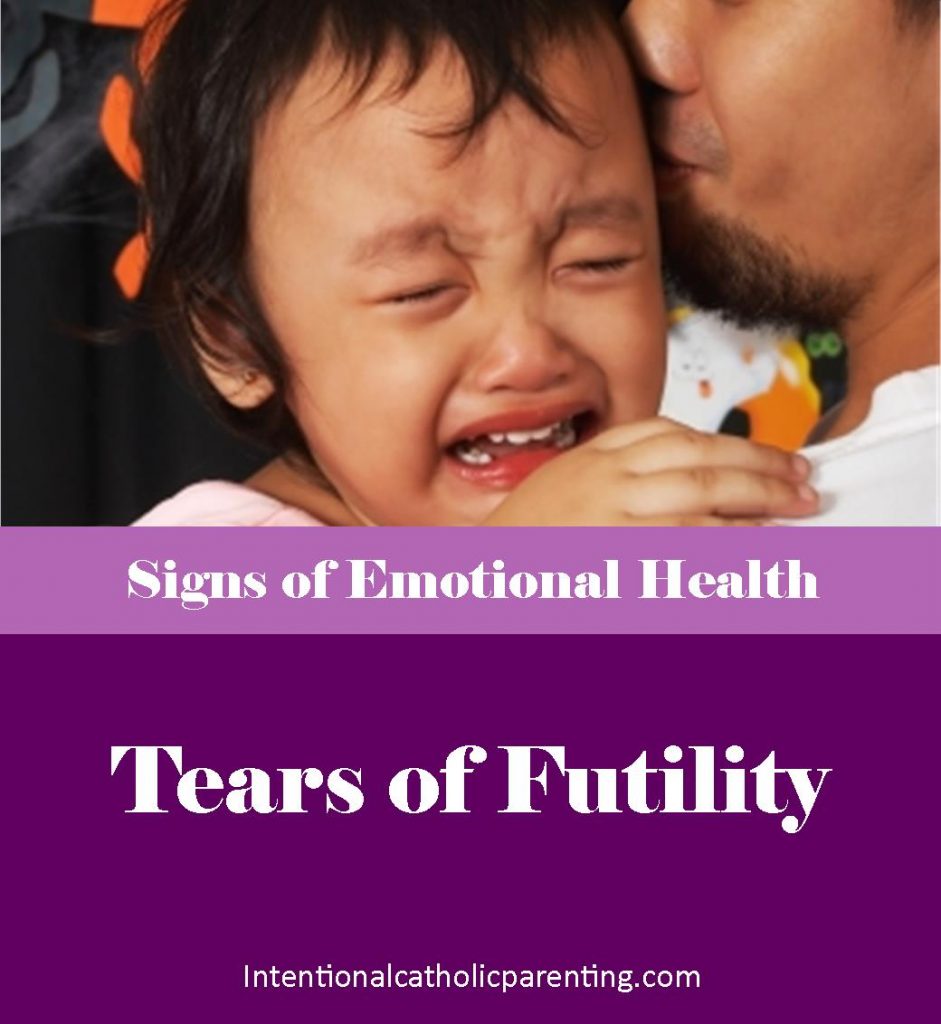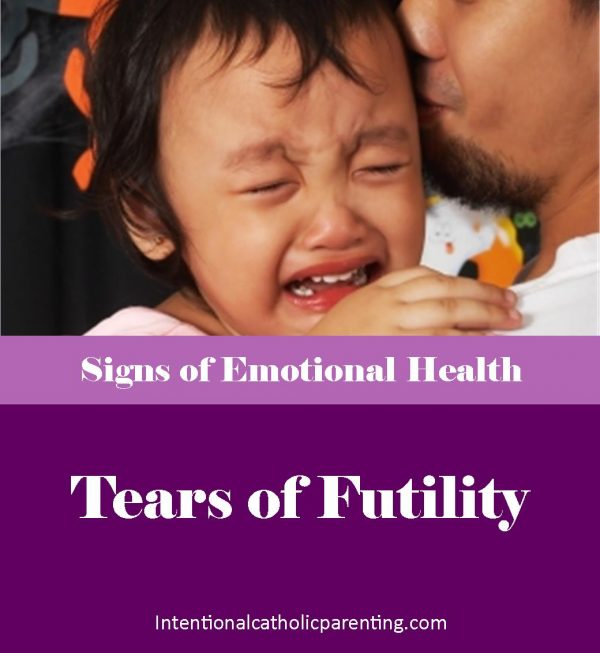
“Not only that, but we even boast of our afflictions, knowing that affliction produces endurance, and endurance, proven character, and proven character, hope, and hope does not disappoint, because the love of God has been poured out into our hearts through the Holy Spirit that has been given to us.” – Romans 5:3-5
In my first post on signs of emotional health in our children, I talked about “the venturing forth spirit”: that beautiful energy within our children that leads them to explore and create. Such venturing forth is a powerful force in leading children toward their potential.
Another sign of emotional health in our children is the ability to cry when they are faced with futility. Yep, that’s right. Tears can be healthy. This is one of Gordon Neufeld’s key insights about human flourishing.
What does he mean by this? Why would we want our children to cry? It’s not that we want them to cry, but they need to be able to cry when they are faced with things they can’t change. Without having their tears of futility, they will be stuck in immaturity.
Why Tears of Futility Are Healthy
Every day, children face things they can’t change. They want candy before dinner, they want the latest gaming console, they want to win every game they play. But they can’t always have these things. When they face a loss or our “no,” this leads them to experience FRUSTRATION. They can try to change the outcome, and in life sometimes we can change a loss to a win, or a no to a yes. But not always.
As they mature, kids are increasingly capable of adapting to these setbacks. They experience sadness or disappointment, but then they learn that they can survive without the win, the object, or whatever it is they hoped for. When they’re able to feel this sadness or disappointment, and really let go, something happens to them. They become more resilient and able to thrive even in the face of obstacles. They become more resourceful, finding creative solutions to problems, adjusting their approach.
Check out the scripture passage again that opened this article:
Not only that, but we even boast of our afflictions, knowing that affliction produces endurance, and endurance, proven character, and proven character, hope, and hope does not disappoint, because the love of God has been poured out into our hearts through the Holy Spirit that has been given to us. – Romans 5:3-5
Adaptation right there! Adults who are mature, who possess this adaptive quality, don’t crumble and tantrum in the face of setbacks. Setbacks give them strength, build their character, and leave them with hope. They possess true humility; they recognize their value even though they are imperfect, even when they fail. They develop deeper trust as they lean into God and rest in his care when things don’t go their way.
You see, in life we are changed by the things we can’t change. Even if we can’t change something, we are transformed when we surrender, experience the loss, and move on.
When Children Lose Their Tears
Children lose their tears of futility for many different reasons. Sometimes children face a particular loss that is too much for them to bear, perhaps a death or a divorce, and they never had their tears over this loss. Some children know intuitively that that it’s not safe to cry; they don’t trust that they’ll be okay if reveal their vulnerability. So these children are stuck. They can become depressed, dominating, or aggressive.
One of the most common reasons children lose their tears is that the child’s parents are too passive or permissive, failing to set boundaries and limits. Loving parents often want to shield their children from disappointment or loss; they don’t want their children ever to feel upset. So they give their child everything he wants, or clear his path of obstacles and losses. This is helicopter parenting.
I guess we parents need to adapt to the futility of wanting our kids always to be chipper, bubbly children!
Of course, not all tears are the same. There is a difference between despair or trauma and the kind of healthy sadness I am talking about. The tears of futility are actually chemically different from the tears of trauma. They are full of toxins, so when our child cries tears of futility, it’s literally a cleansing process!
Clearly, we should avoid the tears that come from abuse or injury. And we have to recognize what is too much loss for a child to bear, particularly at different developmental stages. But in general, as they mature, our children become capable of adapting to the losses and disappointments of life. Learning to adapt to small losses in childhood prepares them to adapt to bigger losses and tragedies down the road.
When children never face futility, they become entitled, spoiled, and crumble when they face the real world where they can’t get everything they want, where they will sometimes lose, where they will sometimes be slower, smaller, or less capable than somebody else.
The answer to the problem lies in relationship, not in a discipline technique. These children have to face futility, have somebody to trust with their sadness, have their tears, and adapt.
How to Lead Your Child Through the Tears of Futility
So how does this work? How do we lead our children to healthy tears?
Let me clarify that “tears” need not be literal tears. Little ones will have physical tears, but teenagers may just experience sadness and mourning.
Most of the time, this will happen quite naturally. Many times a day your child faces a no or a setback and feels upset about it. All you need to do is give your child a hug and a smile, and you both move on.
Sometimes though, your child will need a little extra support to find his tears. He might be resisting your rule or boundary; he might insist that the new baby goes back to the hospital; he might demand that Grandpa visit him from heaven. What can you do in these situations?
First, we need to be clear with ourselves about what our child can and cannot change, and we need to stick to it. If we don’t allow cookies for breakfast, then this is a futility our child has to face, no matter how much he whines or even if he throws his oatmeal.
Second, we have to hold our child in the futility, but with compassion. This means that we are gentle, comforting, and come alongside the child while he feels his upset. “This is so disappointing, I know.” “This feels huge. I am right here, Buddy.” “This isn’t working for you. I understand.”
When it feels like a big loss, it may take a while for your child to let go. In this beautiful story, a parent shares how her son grieved his cat dying. She led him through his grief, helping him to remain soft and vulnerable even in the face of something that felt so big to him. He needed extra support for several weeks, but he eventually shifted to acceptance.
Be Your Child’s “Angel of Comfort”
Gordon Neufeld frequently says that “parents are agents of futility, but angels of comfort.” Some of us faced plenty of futility growing up, but we weren’t comforted at all. We heard shrieks of “NO!” or we were even punished for showing our disappointment about something. This will not nourish the adaptive process; it only scares the child and causes him to put up his guard. We need to be both the agent of futility and the angel of comfort for our child.
Sometimes a child resisting futility can push our buttons and we can feel our intentions to be gentle and compassionate go out the window. In these moments, we can take a deep breathe, reach out to Mary for support, and take a break until we have collected ourselves. But we will never do our child any favors by shielding him from every disappointment.
Priming the adaptive process in a gentle, compassionate way can be hard work for parents, but I’ve discovered that in the long run, it really makes our parenting vocation easier!
Resources
Rest, Play, Grow: Making Sense of Preschoolers by Deborah MacNamara. Dr. MacNamara’s book explains Dr. Neufeld’s model of human development as it relates to preschoolers. Highly recommended.
“Resilience: Embracing the Emotional Journey” by Deborah MacNamara.
“Parenting in Stressful Times” by Eva de Gozstonyi. Leading children to emotional rest after catastrophic events.

